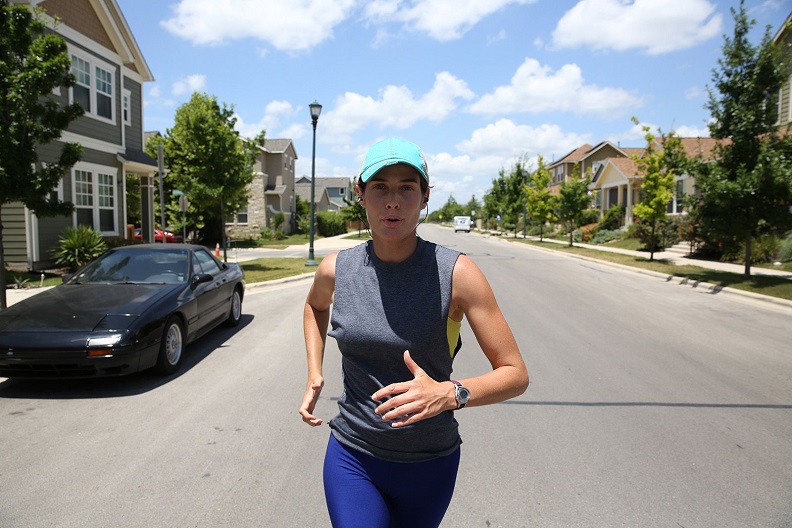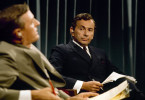Results
Director: Andrew Bujalski
5:30 p.m. Friday–Saturday, 2 p.m. Sunday
Oklahoma City Museum of Art
B-
The realm of start-up gyms and motivational posters is never a painless endeavor. Andrew Bujalski’s Results is a film that examines, refutes and transmits the troubled and sordid trials of personal fitness. The filmmaker’s tight grip on reality paired with his apt representation of the beautiful and bizarre within our day-to-day celebrates both the humor and the discord of American life. Results is far from revelatory, but it’s in that lack of revelation that it resonates so powerfully and organically.
Danny (Kevin Corrigan), a recently divorced and lethargic millionaire living in Austin, seeks the guidance of a personal fitness trainer to alleviate his depression and loneliness. Danny’s search leads him to the services of “Power 4 Life,” a small yet growing organization owned by the unusually optimistic Trevor (Guy Pearce). After Trevor reluctantly assigns his top trainer, Kat (Cobie Smulders), to work with Danny, an unforeseen closeness between the latter two characters spurs an early termination of Danny’s $25,000 prepaid subscription. After Trevor confronts Danny about the discomfort he may have caused Kat, the two men agree to work with one another, with Danny going so far as to finance a much-needed move for the gym. However, tensions between all three characters ultimately throw the fate of “Power 4 Life” into the air as the trio encounter a faculty less influenced by calf raises: honesty.
The sweat, tears and frequent consumption of alcohol would, at a glance, distance this work from Bujalski’s 2013 tech-comedy, Computer Chess. Not unlike it, though, Results is carefully interwoven with a down-to-earth discourse, opting out of the grandeur and extravagant in favor of more actualized interactions.
Bujalski pays careful attention to the quirks of an individual, especially those perhaps never made public. For example, one scene follows Trevor threw an evening routine as he pesters his dog and plays a drum kit until any semblance of a melody has long begun to decay. In contrast, we see Danny lazily gliding through his life, posting several hundred-dollar Craigslist rewards for helping him set up his television or configure his computer. Despite the obvious contrast between the two men’s lives, carefully stitched together scenes show just how similar Danny is to Trevor despite diets and instruments.
Justin Rice’s score encapsulates the film’s structure to a point of near-seamlessness. In one instance, Trevor plays violently on his drum while Danny casually plucks at the strings of an electric guitar. Gradually, the pair’s long-distance ballad begins to sync, achieving something enjoyable before abruptly ending with a physical confrontation. Rice’s music is at time uplifting, and at others laxer, sure to emphasize any mistake in the assembly. He does so with praise, of course, as the compositions sometimes audibly emulate the mental missteps we often take.
In terms of performances, Results rivals the best comedy of the year. Kevin Corrigan plays the mellow stoner/alcoholic type without any trouble, seeming to take at least small cues from Tim Heidecker’s work in The Comedy. Pearce is also an incredible talent, but the range exhibited by Smulders overshadows the entirety of the male cast, as she bounds between bouts of self-doubt and determinism readily and without any superficial jargon. Smulders breathes life into Kat, yielding a neurotic and authoritative force.
Results does occasionally suffer from dryness, as not all scenes flow as well as some of the best. Though Danny and his acquaintances joke about his wasteful spending, some of the later scenes with the character feel more like uninspired asides. Likewise, brief moments of magic-realism, mostly experienced through the eyes of Trevor, feel short and unexplored. Said moments, all with the exclusion of one, do well to illustrate the trainer’s dreams but do little in the final movements of the film.
Results never pulls any countless, hearty laughs, and the romantic sections would be hard-pressed to withdraw any tears. But Bujalski seems to cultivate the most appreciative moments of life without pulling you out with a needless gag. He instead opts for a cinematic approach that disintegrates the superficial, leaving only the core of modern relationships for us to appreciate. Fortunately, that’s more than enough.





